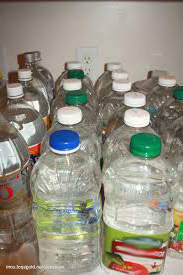This year with the drought, I am watching streams and other water sources disappear. I have lived in this area for over 30 years and have talked with people who have lived here much longer and no one can remember a drought of this magnitude. Now I know this water shortage does not affect all the areas of this country, but a large part of the western US is effected. I strongly suggest that now is a good time to add to your water storage, so my post today is some suggestion on storing water.
If you reside in a city or urban area, you are probably dependent on a municipal water system. In times of turmoil, they will not be reliable. Be aware of other sources of water in your neighborhood. For instance, rivers, streams, swimming pools, or fountains can be useful sources of water. Ponds in golf courses and city parks may not be a good source of drinking water. The grass around them is normally heavily fertilized and they can become filled with harmful chemicals.
Depending on where you live you may want to check with some of the older residences and find out if there are any old wells that have been capped and abandoned.
The plumbing system in high rises, office buildings, apartments and other large structures contain large amounts of water. Become familiar with the buildings you have access to and learn how to isolate the water system from the municipal supply. Once the system has been isolated from the municipal water system, you can drain water as needed. It is best if the building system is isolated from the municipal system before the municipal system becomes contaminated. If you encounter contaminated water, be sure and purify it.
Beware of fire sprinkler systems. In cold climates, they may contain anti freeze. The anti freeze is poison and can kill you if consumed.
Improvised methods for storing water
A friend of mine saves his two-liter soda bottles, washes them out, and fills them with fresh water. He then throws them in the crawl space under his home. Two-liter soda bottles make excellent storage containers. These are strong, light and designed to hold liquids. Every day you throw away high quality storage containers, such as juice and water bottles
Beware of plastic milk containers. They have a tendency to break down and the lids do not seal well. In the past, many sources have recommended using old bleach bottles. However, the current manufacturers of bleach advise against the use of bleach bottles for water storage. I have tried it and the water tasted so bad I couldn’t drink it. Do not use containers that have been used to store nonfood items.
Be careful where you store your plastic water bottles. Plastic bottles are permeable and should not be stored near flammable liquids, pesticides, or other chemicals. They will pick up tastes and odors of chemicals and flammable liquids stored in close proximity.
Collecting rainwater is an option. You can build a improvised cistern for storing water fairly easily. You can build one with a minimum of 3 sheets of ¾ inch plywood, plastic tarps and a number of 2x4s or 4x4s. Build a simple box measuring 4x4x8 feet and lined with heavy plastic. This will hold approximately 950 gallons of water. One inch of rain from a 2000 sq ft roof will equal about 1200 gallons. Remember you are dealing with a lot of weight so the 2x4s and 4x4s will be needed to reinforce the box. This amount of water will weight over 7000 pounds, if you completely fill it. You can store the materials until needed.
Storing water may be one of the most important things you have to accomplish to protect your family. Store as much as you can.
Howard



Bottles that once held bleach and laundry detergent would be okay to hold water for flushing the commode and anywhere a person cab use non-potable water.
I have been saving gallon plastic jugs (like milk jugs) with screw-on tops that distilled water came in. Would those be ok to store anywhere, like a crawlspace? Wgen needed, I would filter it through a Royal Berkey.
I always hear people talking about storing runoff water from the roofs, however nobody ever talks about the northern climates and what they would do in the winter time